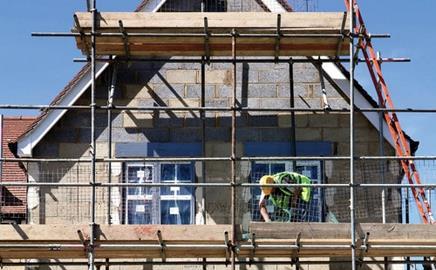Year-long inquiry finds ŌĆślittle evidenceŌĆÖ of malpractice, but says eco targets could affect competition
A year-long inquiry by the governmentŌĆÖs competition watchdog into the housing industry has found that the drive for zero-carbon homes could affect competition in the industry.
However, in a major victory for the sector, the study by the Office of Fair Trading (OFT) found ŌĆ£little evidenceŌĆØ of anti-competitive practice by housebuilders and ŌĆ£no evidenceŌĆØ of monopolies, even on a local level.
Also, as predicted by ║├╔½Ž╚╔·TV two weeks ago, the inquiry endorsed a proposed code of conduct to improve levels of customer satisfaction. But it said the government would step in if certain milestones were not met.
The report, published yesterday, found the move to zero carbon may push up customer complaints and that small firms ŌĆ£may struggle, without assistance, to meet the requirementsŌĆØ. It called on the government to provide help to small housebuilders.
Heather Clayton, the OFTŌĆÖs senior director of infrastructure, said: ŌĆ£We did get a lot of representations about the Code for Sustainable Homes and the difficulties smaller builders might have with it.
ŌĆ£The government needs to think of how it can provide support for smaller builders.ŌĆØ
Imtiaz Farookhi, chief executive of the NHBC, the new homes warranty body, described the report as a ŌĆ£victory for common senseŌĆØ and said he was ŌĆ£very pleasedŌĆØ the report had raised the issue of the impact of the Code for Sustainable Homes on smaller builders. ŌĆ£There are big risks and big challenges to bringing in more regulations, particularly at this stage in the market.ŌĆØ
Neil Jefferson, chief executive of the cross-industry Zero Carbon Hub, said: ŌĆ£In this difficult market, zero carbon is a potential barrier to competition.ŌĆØ
The Home Builders Federation described the report as a ŌĆ£huge boostŌĆØ to the industry.
The OFT has set four milestones on the path to establishing a new code to protect consumers, which it says must be up and running by March 2010 (see box). The OFT will also recommend a statutory redress system, paid for by a levy on the industry.
The code will cover issues such as dispute resolution and moving-in dates, and is endorsed in principle by lenders and builders.
Clayton said she was worried that customer satisfaction levels may fall further because of the housing slump, with builders laying off thousands of staff who could have provided after-sales service.
Main findings
- There are no monopolies, no anti-competitive practices and no unnecessary landbanking
- Some homebuyers experience ŌĆ£significantŌĆØ distress relating to their purchase
- There are ┬Ż174m worth of customer problems with new homes each year next to sales of ┬Ż45bn
- The move to zero carbon may mean smaller firms struggle to compete
Recommendations
- Industry code to be set up by March 2010
- Statutory redress system to be imposed if industry fails to meet code milestones
- Government must assist smaller housebuilders to meet the zero-carbon agenda
- Government should make planned community infrastructure levy payable on completion of construction to avoid hurting the cash flow of small builders





























No comments yet